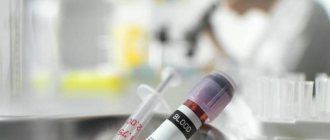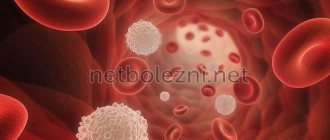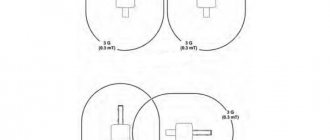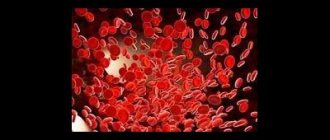Protein deficiency is a pathological condition of the body caused by a deficiency of amino acids. Protein deficiency is a frequent clinical episode in the life of a cancer patient, which is caused by antitumor treatment and the disease itself.
With inadequate nutrition, the body lacks not only protein molecules, but also other nutrients - fats, carbohydrates, microelements - the same equal sources of energy and “building materials”, which is why the outdated name of the condition is “nutritional dystrophy”, and the modern one is protein-energy dystrophy (PEM) or nutritional deficiency.
Causes of protein deficiency
There are plenty of reasons for malnutrition in a cancer patient:
- aversion to food during chemotherapy and the toxic effects of drugs on the mucous membranes, blood and endocrine glands;
- painful local complications of radiation, especially the oral cavity, abdominal organs and rectum;
- severe combined operations with the removal of several organs and a long recovery period with inevitable dietary restrictions;
- the increasing need of a growing tumor for building and energy material, robbing all healthy organs, which inevitably reduces their functionality;
- activation of the breakdown of protein molecules circulating in the blood under the influence of aggressive products and toxins of tumor cells;
- the impossibility of adequate nutrition when the gastrointestinal tract is damaged.
A special case of protein deficiency is the loss of protein molecules along with ascitic fluid removed from the abdominal cavity during peritoneal carcinomatosis.
To start PEM, it is enough to limit the supply of food nutrients for several days, the rest will be done by the tumor and the characteristics of the patient’s body created by it: the rapid destruction of proteins is potentiated, with the impossibility of synthesizing essential amino acids and the constantly growing need of malignant cells for building materials and energy.
Constant fatigue
Various proteins and their constituent amino acids are involved in a variety of metabolic processes. With a lack of protein, metabolism slows down, the body goes into saving mode, which leads to a feeling of fatigue and a desire to reduce energy consumption. Protein deficiency affects not only the condition of muscle mass, but also the functioning of the brain: the activity of nerve cells slows down, and signals pass through fibers worse. Subjectively, this is expressed in apathy, reluctance to do something, drowsiness, and a feeling of fog in the head.
Consequences of protein energy deficiency
Inadequate nutrition - for at least a week, a decrease in the intake of amino acid substrates by more than 60% of the norm. In the real life of an oncology patient, the period of limited food intake can reach several weeks, and restoration of natural nutrition does not guarantee sufficient intake of nutrients, including due to dietary restrictions.
Complications of insufficient intake depend on the volume of protein losses and the chemical composition of incoming amino acids, which is especially difficult for the body without proteins that it cannot synthesize. To continue the functioning of the body, insufficient intake is compensated by taking protein substrates from one’s own tissues; amino acids are lost especially quickly from the liver, muscles and skin. Depletion of the liver parenchyma disrupts the metabolism of many substances. Loss of muscle mass during an active malignant process is cachexia, which can occur without a visible decrease in the volume of fatty tissue. The combination of muscle protein breakdown and appetite disturbance in a cancer patient is called “anorexia-cachexia syndrome.”
Who is the analysis for?
A test for C-reactive protein is mandatory when a patient is admitted to hospital and Covid-19 is diagnosed as at least moderately severe. The analysis is then repeated as necessary.
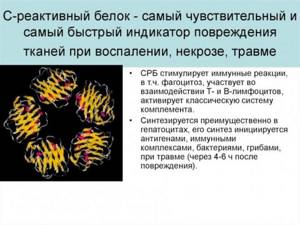
The results are interpreted according to the following values:
If a significant decrease in CRP levels is not observed while taking antibiotics, then the risk of death is extremely high.
The production of C-reactive protein begins to increase in the first 5 hours after infection and reaches its peak by 2-3 days of illness.
A more detailed breakdown of the analysis results looks like this (mg/l):
- negative –
- weakly positive – 3-6;
- positive – 6-12;
- strongly positive – >12.
Symptoms of protein deficiency
First of all, insufficient nutrition causes weakness and rapid fatigue. For any reason of fasting, less of the required protein substances, mainly albumins, circulate in the blood, and a little later the concentration of globulins decreases. When the protein content in a liter of blood plasma reaches 50-60 grams, the sugar level drops in parallel, all metabolic processes in the body slow down - the intensity of overall metabolism decreases by one fifth. Hematopoietic processes are disrupted, the function of all organ systems decreases, body temperature drops, hair falls out, and immune defense is inadequate. The formation of enzymes in the digestive tract is especially affected, which disrupts an already poor appetite.
When protein substances decrease to 30-40 grams per liter of plasma, edema appears, masking muscle exhaustion. In a regime of chronic nutrient restriction, dysfunction of internal organs worsens, brain cells are unable to maintain their function - intellectual activity suffers, and the patient’s consciousness is inhibited. The basal metabolism drops to 50-60% of normal. The lack of proteins from which any cell is built affects everything - normal cells of organs and tissues die, new ones do not appear. The patient spends most of the day in bed, often without the strength to care for himself.
Features of C-reactive protein in old age
CRP levels in older people may increase due to age-related changes and concomitant diseases. One of the reasons is dementia, in which there is a lot of C-reactive protein.
Senile dementia most often develops with generalized - general - inflammation associated with vascular atherosclerosis, high concentrations of triglycerides (fats) and low-density lipoproteins.
In addition, when biological processes caused by the change of day and night (circadian rhythms) are disrupted and the lack of night sleep in the blood increases the content of substances that cause inflammation. At the same time, the level of C-reactive protein also increases.
An increase in CRP is characteristic of hypertension against the background of vasoconstriction due to cholesterol deposits, as well as obesity. A stroke is often a complication of atherosclerosis, which is accompanied by inflammation of the vascular wall, so immediately after the attack there is a sharp release of C-reactive protein into the blood.
One of the reasons for increased CRP may be periodontal disease - inflammation of the gums. Moreover, the higher its level, the more severe the degree of periodontal disease.
Increased concentrations of CRP accompany inflammatory bowel pathologies associated with poor diet and unhealthy lifestyle, as well as Crohn's disease and ulcerative colitis.
Diagnostics
Diagnosing protein deficiency of varying degrees is not very difficult. Diagnostic signs of protein-energy malnutrition in a cancer patient:
- weight loss per month by 5% or a tenth over six months;
- decrease in muscle mass, determined by a decrease in the circumference of the upper third of the shoulder;
- reduction in the thickness of the skin fold with fatty tissue on the shoulder;
- changes in blood parameters such as total protein, albumin, transferrin, and the total number of lymphocytes.
In most cancer patients, to establish PEM, it is enough to track the dynamics of weight loss over the past few months. In patients with initial obesity, when fatty tissue masks muscle atrophy, a blood test will put everything in its place: a clinical analysis shows a decrease in the number (not percentage) of lymphocytes; in biochemical - a decrease in the concentration of protein fractions and total protein, insufficient ferritin.
DRR for Covid-19
The level of C-reactive protein during coronavirus is one of the key laboratory indicators that require medical monitoring in moderate and severe forms of infection. It must also be determined in patients in critical condition.
It is C-reactive protein (C is our letter C) that is the main marker of lung damage, growing as the severity of the infectious process and the scale of inflammatory changes increase.
The level of CRP must be determined in case of difficulty breathing, when the number of breaths is ≥ 22/min, and saturation
Saturation is measured with a special device - a pulse oximeter.
Treatment
At a minimum, a cancer patient should receive 1 gram of protein per kilogram of body weight per day with food, but given the activity of a malignant tumor in “weaning” amino acids from normal tissues, it is advisable to consume one and a half grams. The exception is patients with kidney failure; their maximum dose of protein products cannot be higher than 1.2 grams.
Since in a cancer patient, protein deficiency is always a consequence of inadequate consumption or loss of proteins during the evacuation of ascitic fluid, it is unlikely to relieve the pathological condition in a natural way - by increasing the amount of food.
Statement of a loss of 5% of weight with an initial BMI below 20, a decrease in total protein per liter of plasma to 60 g and globulin to 30 g with the impossibility of normal nutrition is the basis for the urgent prescription of specialized protein mixtures.
If the indicators are worse or it is impossible to feed by mouth - enterally, for example, with cancer of the esophagus or stomach, the question of tube or intravenous nutrition is raised. In all cases, enteral nutrition is preferable rather than intravenous, because the composition of the elements of the food product is always more diverse than a solution of crystalline amino acids.
Reducing the toxicity of treatment and symptomatic therapy is an urgent need, but without high-quality nutritional support it is impossible to improve the quality of life and speed up the rehabilitation of a cancer patient. Patients at all stages of treatment need different nutritional support and always under the supervision of a specialist.
Professional treatment of protein deficiency is not an additional option to antitumor therapy, but an integral component of it. For patients in our clinic, nutritional support is as mandatory as chemotherapy, radiation and surgery.
Book a consultation 24 hours a day
+7+7+78
Norm
The normal value of C-reactive protein does not exceed 5 mg/l. This is a universal value that does not depend on age or gender. In newborns it should not rise more than 0.15 mg/l.
If CRP is elevated, it means that inflammation is developing in the body, the intensity of which is indicated by the degree of this increase.
Thanks to many years of clinical research and the introduction of high-tech techniques, scientists have derived another parameter - the so-called “basic CRP value”. Its level makes it possible to assess how high the risk of damage to the cardiovascular system is in a person.
Note that this risk can be determined even in the absence of an inflammatory reaction. The norm for the basic value of CRP is ≤ 1 mg/l.
For the most accurate results, it is recommended to take the C-reactive protein test in the same laboratory, since different clinics may use different methods:
- ELISA – enzyme-linked immunosorbent assay;
- RID – radial immunodiffusion method;
Nephelometry, based on the intensity of the light flux scattered by suspended particles of matter.
If repeated tests are done using other methods, the interpretation of the results may be inaccurate.
How to avoid trouble?
In order to never encounter this problem (and this, unfortunately, is possible), you need to think about its prevention. That is, learn as much useful information as possible about your body and its needs for important nutrients.
Understand why it is necessary to adjust your diet based on your current state of health and metabolism, taking into account all diseases.
And not only rejoice at new knowledge, but also convey it to loved ones, create useful “word of mouth”, which, perhaps, will protect someone from a frivolous attitude to nutrition.
How to determine body mass index (BMI)?
Poor nutrition is a double-edged sword, both of which are unpleasant. On the one hand, it can lead to problems with excess weight. On the other hand, in the case of protein-energy deficiency, it leads to a lack of body weight, and it can hardly be said that this is not as dangerous as extra pounds.
You can determine your body mass index using our BMI Calculator.
- 16 or less – Severe underweight
- 16-18.5 – Insufficient body weight
- 18.5-25 – Normal
- 25-30 – Excess body weight (pre-obesity)
- 30-35 – First degree obesity
- 35-40 – Second degree obesity
- 40 or more – Third degree obesity (morbid)
What may affect the results
Total protein
levels increase with prolonged tourniquet pressure during blood collection.
A decrease in the concentration of total protein and a change in the ratio of protein fractions occurs in the third trimester of pregnancy against the background of an increase in blood volume and its dilution.
You can donate blood to determine the level of total protein (Protein total) at the nearest INVITRO medical office. A list of offices where biomaterial is accepted for laboratory testing is presented in the “Addresses” section.
Interpretation of study results contains information for the attending physician and is not a diagnosis. The information in this section should not be used for self-diagnosis or self-treatment. The doctor makes an accurate diagnosis using both the results of this examination and the necessary information from other sources: medical history, results of other examinations, etc.
Proteins play a huge role in the human body. They are the main structural unit of the cell, perform many functions (mechanical, catalytic, signaling), and transport various substances. Proteins are based on hormones, enzymes that affect the rate of biochemical reactions, and immunoglobulins that protect the body from infections.
Total blood protein is the sum of all protein fractions in the blood.
They maintain colloid-osmotic pressure and thereby a constant blood volume, bind and retain water, preventing it from leaving the bloodstream, participate in ensuring acid-base balance and blood clotting, transport various inorganic and organic substances, bind macro- and microelements, and participate in in immune response reactions, etc.
The starting material for the construction of protein molecules are amino acids, which enter the body with food. The main plasma proteins are synthesized in liver cells, with the exception of immunoglobulins, which are produced in plasma cells (plasmocytes) and lymphocytes.
